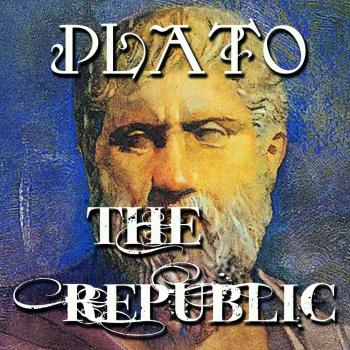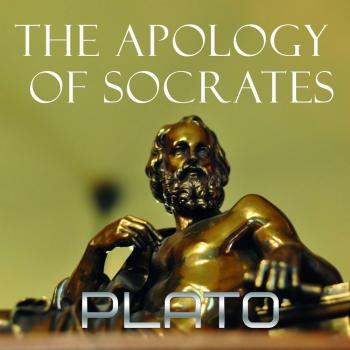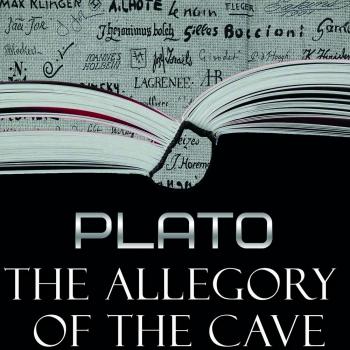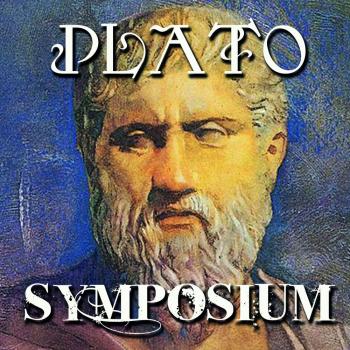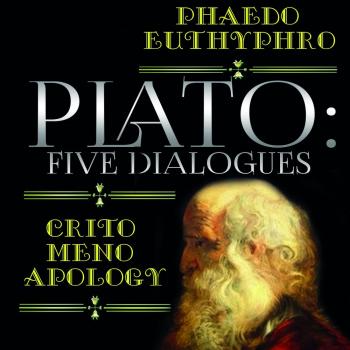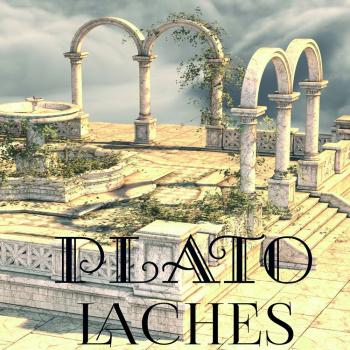Платон
Список книг автора ПлатонThe Republic
he Republic (Greek: Πολιτεία, Politeia; Latin: Res Publica) is a Socratic dialogue, written by Plato around 375 BC, concerning justice (δικαιοσύνη), the order and character of the just city-state, and the just man. It is Plato's best-known work, and has proven to be one of the world's most influential works of philosophy and political theory, both intellectually and historically. In the dialogue, Socrates talks with various Athenians and foreigners about the meaning of justice and whether the just man is happier than the unjust man. They consider the natures of existing regimes and then propose a series of different, hypothetical cities in comparison, culminating in Kallipolis (Καλλίπολις), a city-state ruled by a philosopher king. They also discuss the theory of forms, the immortality of the soul, and the role of the philosopher and of poetry in society. The dialogue's setting seems to be during the Peloponnesian War. The Republic is generally placed in the middle period of Plato's dialogues—that is, it is believed to be written after the early period dialogues but before the late period dialogues. However, the distinction of this group from the early dialogues is not as clear as the distinction of the late dialogues from all the others. Nonetheless, Ritter, Arnim, and Baron—with their separate methodologies—all agreed that the Republic was well distinguished, along with Parmenides, Phaedrus and Theaetetus.
The Apology of Socrates
The Apology of Socrates was written by Plato. In fact, it’s a defensive speech of Socrates that he said in a court noted down by Plato. The main subject of the speech is a problem of the evil. Socrates insists that neither death nor death sentence is evil. We shouldn’t be afraid of the death because we don’t know anything about it. Socrates proved that the death shouldn’t be taken as the evil with the following dilemma: the death is either a peace or a transit from this life to the next. Both can’t be called evil. Consequently, the death shouldn’t be treated as evil.
The Allegory of the Cave
The Allegory of the Cave, or Plato's Cave, was presented by the Greek philosopher Plato in his work Republic (514a–520a) to compare «the effect of education (παιδεία) and the lack of it on our nature». It is written as a dialogue between Plato's brother Glaucon and his mentor Socrates, narrated by the latter. The allegory is presented after the analogy of the sun (508b–509c) and the analogy of the divided line (509d–511e). All three are characterized in relation to dialectic at the end of Books VII and VIII (531d–534e). Plato has Socrates describe a group of people who have lived chained to the wall of a cave all of their lives, facing a blank wall. The people watch shadows projected on the wall from objects passing in front of a fire behind them, and give names to these shadows. The shadows are the prisoners' reality.
Symposium
The Symposium (Ancient Greek: Συμπόσιον, Sympósion [sympósi̯on]) is a philosophical text by Plato dated c. 385–370 BC. It depicts a friendly contest of extemporaneous speeches given by a group of notable men attending a banquet. The men include the philosopher Socrates, the general and political figure Alcibiades, and the comic playwright Aristophanes. The speeches are to be given in praise of Eros, the god of love and desire. In the Symposium, Eros is recognized both as erotic love and as a phenomenon capable of inspiring courage, valor, great deeds and works, and vanquishing man's natural fear of death. It is seen as transcending its earthly origins and attaining spiritual heights. This extraordinary elevation of the concept of love raises a question of whether some of the most extreme extents of meaning might be intended as humor or farce. Eros is almost always translated as «love», and the English word has its own varieties and ambiguities that provide additional challenges to the effort to understand the Eros of ancient Athens. The event depicted in the Symposium is a banquet attended by a group of men, who have come to the symposium, which was, in ancient Greece, a traditional part of the same banquet that took place after the meal, when drinking for pleasure was accompanied by music, dancing, recitals, or conversation. The setting means that the participants will be drinking wine, meaning that the men might be induced to say things they wouldn't say elsewhere or when sober. They might speak more frankly, or take more risks, or else be prone to hubris—they might even be inspired to make speeches that are particularly heartfelt and noble. The host has challenged the men to deliver, each, in turn, an encomium—a speech in praise of Love (Eros). Though other participants comply with this challenge, Socrates notably refuses to participate in such an act of praise and instead takes a very different approach to the topic. The party takes place at the house of the tragedian Agathon in Athens. This dialogue is one of Plato's major works, and is appreciated for both its philosophical content and its literary qualities.
Plato: Five Dialogues: Euthyphro, Apology, Crito, Meno, Phaedo
Plato was a philosopher in Classical Greece and the founder of the Academy in Athens, the first institution of higher learning in the Western world. He is widely considered the most pivotal figure in the development of philosophy, especially the Western tradition. Unlike nearly all of Plato's philosophical contemporaries, Plato's entire body of work is believed to have survived intact for over 2,400 years. The works which are most often assigned to Plato's early years are all considered to be Socratic dialogues, written from 399 to 387. Plato's Middle dialogues were writtten from 387 to 361 and Plato's latter dialogues were written in the period between 361 and his death in 347. This anthology volume includes Five Dialogues of Plato; Euthyphro – Apology – Crito – Phaedo – Meno. Apology, Crito, and Phaedo are dialogues in which Plato details the Philosopher Socrates' last days. Meno is a Socratic dialogue that attempts to determine the definition of virtue in general, rather than particular virtues, such as justice or temperance. Plato's Euthyphro is set in the weeks leading up to Socrate's trial, it features Socrates and Euthyphro, a religious expert who attempts to define piety or holiness. Plato's works are often textbook required reading for courses in politics & social sciences, philosophy, humanities, and Greek & Roman studies. This anthology volume includes many of Plato's most popular and studied works. The dialogues of Plato – Early, Transitional and middle, Later middle, Phaedo, Later middle, Late, Of doubtful authenticity.
Phaedo
Phædo or Phaedo (Greek: Φαίδων, Phaidōn), also known to ancient readers as On The Soul, is one of the best-known dialogues of Plato's middle period, along with the Republic and the Symposium. The philosophical subject of the dialogue is the immortality of the soul. It is set in the last hours prior to the death of Socrates, and is Plato's fourth and last dialogue to detail the philosopher's final days, following Euthyphro, Apology, and Crito. One of the main themes in the Phaedo is the idea that the soul is immortal. In the dialogue, Socrates discusses the nature of the afterlife on his last day before being executed by drinking hemlock. Socrates has been imprisoned and sentenced to death by an Athenian jury for not believing in the gods of the state (though some scholars think it was more for his support of «philosopher kings» as opposed to democracy) and for corrupting the youth of the city. By engaging in dialectic with a group of Socrates' friends, including the two Thebans, Cebes, and Simmias, Socrates explores various arguments for the soul's immortality in order to show that there is an afterlife in which the soul will dwell following death. Phaedo tells the story that following the discussion, he and the others were there to witness the death of Socrates. The Phaedo was first translated into Latin from Greek by Henry Aristippus in 1160. Today, it is generally considered one of Plato's great works. The dialogues of Plato – Early, Transitional and middle, Later middle, Phaedo, Later middle, Late, Of doubtful authenticity.
Meno
Meno (Greek: Μένων, Menōn) is a Socratic dialogue scripted by Plato. It appears to attempt to determine the definition of virtue, or arete, meaning virtue in general, rather than particular virtues, such as justice or temperance. The first part of the work is written in the Socratic dialectical style and Meno is reduced to confusion or aporia. In response to Meno's paradox (or the learner's paradox), however, Socrates introduces positive ideas: the immortality of the soul, the theory of knowledge as recollection (anamnesis), which Socrates demonstrates by posing a mathematical puzzle to one of Meno's slaves, the method of hypothesis, and, in the final lines, the distinction between knowledge and true belief. Plato's Meno is a Socratic dialogue in which the two main speakers, Socrates and Meno (also transliterated as Menon), discuss human virtue: whether or not it can be taught, and what it is. Additional participants in the dialogue include one of Meno's slaves and the Athenian politician Anytus, a prosecutor of Socrates with whom Meno is friendly. Meno is visiting Athens from Thessaly with a large entourage of slaves attending him. Young, good-looking and well-born, Meno is a student of Gorgias, a prominent sophist whose views on virtue clearly influence Meno's. He claims early in the dialogue that he has held forth many times on the subject of virtue, and in front of large audiences. One feature of the dialogue is Socrates' use of one of Meno's slaves to demonstrate his idea of anamnesis, that certain knowledge is innate and «recollected» by the soul through proper inquiry. The dialogues of Plato – Early, Transitional and middle, Later middle, Phaedo, Later middle, Late, Of doubtful authenticity.
Menexenus
The Menexenus (Greek: Μενέξενος) is a Socratic dialogue of Plato, traditionally included in the seventh tetralogy along with the Greater and Lesser Hippias and the Ion. The speakers are Socrates and Menexenus, who is not to be confused with Socrates' son Menexenus. The Menexenus of Plato's dialogue appears also in the Lysis, where he is identified as the «son of Demophon», as well as the Phaedo. The Menexenus consists mainly of a lengthy funeral oration, referencing the one given by Pericles in Thucydides' account of the Peloponnesian War. Socrates here delivers to Menexenus a speech that he claims to have learned from Aspasia, a consort of Pericles and prominent female Athenian intellectual. Menexenus is unique among the Platonic dialogues in that the actual 'dialogue' serves primarily as exposition for the oration. For this reason, perhaps, the Menexenus has come under some suspicion of illegitimacy, although Aristotle's invocation of the text on multiple occasions seems to reinforce its authenticity. Much of the interest in the Menexenus stems from the fact that it is one of the few extant sources on the practice of Athenian funeral oratory, even though it parodies the medium. Famous dialogues of Plato – Early: Apology, Charmides, Crito, Ion, Euthyphro, Hippias MinorIon, Laches, Lysis; Transitional and middle: Cratylus, Euthydemus, Gorgias, Menexenus, Meno, Phaedo, Protagoras, Symposium; Later middle: Parmenides, Phaedrus, Republic, Theaetetus; Late: Critias, Laws, Philebus, Sophist, Statesman, Timaeus.
Lysis
Lysis (Greek: Λύσις), is a dialogue of Plato which discusses the nature of philia (φιλία), often translated as friendship, while the word's original content was of a much larger and more intimate bond. It is generally classified as an early dialogue. The main characters are Socrates, the boys Lysis and Menexenus who are friends, as well as Hippothales, who is in unrequited love with Lysis and therefore, after the initial conversation, hides himself behind the surrounding listeners. Socrates proposes four possible notions regarding the true nature of loving friendship as: Friendship between people who are similar, interpreted by Socrates as friendship between good men. Friendship between men who are dissimilar. Friendship between men who are neither good nor bad and good men. Gradually emerging: friendship between those who are relatives (οἰκεῖοι «not kindred») by the nature of their souls. Of all those options, Socrates thinks that the only logical possibility is the friendship between men who are good and men who are neither good nor bad. In the end, Socrates seems to discard all these ideas as wrong, although his para-logical refutations have strong hints of irony about them. Famous dialogues of Plato – Early: Apology, Charmides, Crito, Ion, Euthyphro, Hippias MinorIon, Laches, Lysis; Transitional and middle: Cratylus, Euthydemus, Gorgias, Menexenus, Meno, Phaedo, Protagoras, Symposium; Later middle: Parmenides, Phaedrus, Republic, Theaetetus; Late: Critias, Laws, Philebus, Sophist, Statesman, Timaeus.
Laches
The Laches (Greek: Λάχης) is a Socratic dialogue written by Plato. Participants in the discourse present competing definitions of the concept of courage. Laches – Athenian general and statesman, son of Melanopus. Famous dialogues of Plato – Early: Apology, Charmides, Crito, Ion, Euthyphro, Hippias MinorIon, Laches, Lysis; Transitional and middle: Cratylus, Euthydemus, Gorgias, Menexenus, Meno, Phaedo, Protagoras, Symposium; Later middle: Parmenides, Phaedrus, Republic, Theaetetus; Late: Critias, Laws, Philebus, Sophist, Statesman, Timaeus.
